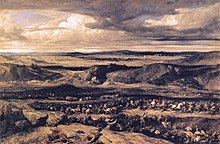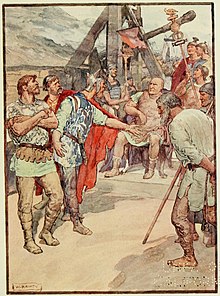Cimbri
In 101 BC, during an attempted invasion of the Italian peninsula, the Cimbri were decisively defeated at the Battle of Vercellae by Gaius Marius, and their king, Boiorix, was killed.
It is known that the peoples of Northern Europe and the British Isles participated in annual partial population seasonal Winter migrations southward to what is now central Iberia and southern France where goods and resources were traded and cross-culture marriages were arranged.
For instance, one could not accept such a reason for their having become a wandering and piratical folk as this that while they were dwelling on a Peninsula they were driven out of their habitations by a great flood-tide; for in fact they still hold the country which they held in earlier times; and they sent as a present to Augustus the most sacred kettle in their country, with a plea for his friendship and for an amnesty of their earlier offences, and when their petition was granted they set sail for home; and it is ridiculous to suppose that they departed from their homes because they were incensed on account of a phenomenon that is natural and eternal, occurring twice every day.
And the assertion that an excessive flood-tide once occurred looks like a fabrication, for when the ocean is affected in this way it is subject to increases and diminutions, but these are regulated and periodical.On the map of Ptolemy, the "Kimbroi" are placed on the northernmost part of the peninsula of Jutland,[9] i.e., in the modern landscape of Himmerland south of Limfjorden (since Vendsyssel-Thy north of the fjord was at that time a group of islands).
After several unsuccessful battles with the Boii and other Celtic tribes, they appeared c. 113 BC in Noricum, where they invaded the lands of one of Rome's allies, the Taurisci.
In 107 BC they defeated another Roman army under the consul Gaius Cassius Longinus, who was killed at the Battle of Burdigala (modern day Bordeaux) against the Tigurini, who were allies of the Cimbri.
The Romans lost as many as 80,000 men, according to Livy; Mommsen (in his History of Rome) thought that excluded auxiliary cavalry and non-combatants who brought the total loss closer to 112,000.
Desperate measures were taken: contrary to the Roman constitution, Gaius Marius, who had defeated Jugurtha, was elected consul and supreme commander for five years in a row (104–100 BC).
The consul Quintus Lutatius Catulus had not dared to fortify the passes, but instead he had retreated behind the river Po, and so the land was open to the invaders.
The Cimbri were annihilated, although some may have survived to return to the homeland where a population with this name was residing in northern Jutland in the 1st century AD, according to the sources quoted above.
[13] Justin's epitome of Trogus has Mithridates the Great send emissaries to the Cimbri to request military aid during the Social War (91-88 BCE).
[15] According to Julius Caesar, the Belgian tribe of the Atuatuci "was descended from the Cimbri and Teutoni, who, upon their march into our province and Italy, set down such of their stock and stuff as they could not drive or carry with them on the near (i.e. west) side of the Rhine, and left six thousand men of their company there as guard and garrison" (Gall.
The adventures of the Cimbri are described by the Danish Nobel Prize–winning author Johannes V. Jensen, himself born in Himmerland, in the novel Cimbrernes Tog (1922), included in the epic cycle Den lange Rejse (English The Long Journey, 1923).
The so-called Cimbrian bull ("Cimbrertyren"), a sculpture by Anders Bundgaard, was erected on 14 April 1937 in a central town square in Aalborg, the capital of the region of North Jutland.
A German ethnic minority speaking the Cimbrian language, having settled in the mountains between Vicenza, Verona, and Trento in Italy (also known as Seven Communities), is also called the Cimbri.
For hundreds of years this isolated population and its present 4,400 inhabitants have claimed to be the direct descendants of the Cimbri retreating to this area after the Roman victory over their tribe.
Most linguists remain committed to the hypothesis of a medieval (11th to 12th century AD) immigration to explain the presence of small German-speaking communities in the north of Italy.
Strabo gives this vivid description of the Cimbric folklore: Their wives, who would accompany them on their expeditions, were attended by priestesses who were seers; these were grey-haired, clad in white, with flaxen cloaks fastened on with clasps, girt with girdles of bronze, and bare-footed; now sword in hand these priestesses would meet with the prisoners of war throughout the camp, and having first crowned them with wreaths would lead them to a brazen vessel of about twenty amphorae; and they had a raised platform which the priestess would mount, and then, bending over the kettle, would cut the throat of each prisoner after he had been lifted up; and from the blood that poured forth into the vessel some of the priestesses would draw a prophecy, while still others would split open the body and from an inspection of the entrails would utter a prophecy of victory for their own people; and during the battles they would beat on the hides that were stretched over the wicker-bodies of the wagons and in this way produce an unearthly noise.If the Cimbri did in fact come from Jutland, evidence that they practiced ritualistic sacrifice may be found in the Haraldskær Woman discovered in Jutland in the year 1835.
Caesar seems to be one of the first authors to distinguish the Celtae and Germani, and he had a political motive for doing so, because it was an argument in favour of his push to set the Rhine as a new Roman border.
The contemporary Gaulish terms for "sea" and "dead" appear to have been mori and *maruo-; compare their well-attested modern Insular Celtic cognates muir and marbh (Irish), môr and marw (Welsh), and mor and marv (Breton).
[27] The science fiction story "Delenda Est" by Poul Anderson depicts an alternate history in which Hannibal won the Second Punic War and destroyed Rome, but Carthage proved unable to rule Italy – which fell into utter chaos.
Cimbri is referenced in Italo Calvino's novel If on a Winter's Night a Traveller as a fictional country that warred with a similarly fictionalised version of Cimmeria, thus imposing its own written language onto the Cimmerians.
Jeff Hein's historical fiction series The Cimbrian War tells the story of the Cimbri and their migration across Iron-Age Europe.



